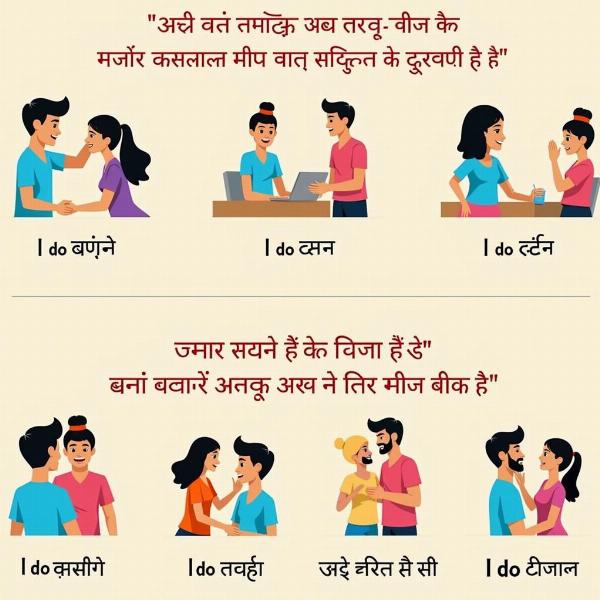Understanding the nuances of translating “I do that” into Hindi can be tricky. It’s not always a simple one-to-one translation, as the best Hindi equivalent depends heavily on the context. This article explores various ways to express “I do that” in Hindi, considering different situations and cultural implications to help you communicate effectively.
Different Ways to Say “I Do That” in Hindi
Translating “I do that” requires understanding the underlying meaning. Are you agreeing to a request? Describing a habit? Or confirming an action? Here are some common Hindi translations and their specific uses:
- Main yeh karta/karti hoon (मैं ये करता/करती हूँ): This is a general translation, suitable for describing habitual actions. Use “karta” if you are male and “karti” if you are female. For example, if someone asks if you regularly cook, you could reply, “Main yeh karti hoon” (I do that).
- Main aisa karta/karti hoon (मैं ऐसा करता/करती हूँ): This translates to “I do this/it like that” and is more appropriate when demonstrating or explaining a specific way of doing something.
- Main yeh kar lunga/lungi (मैं ये कर लूँगा/लूँगी): This indicates a willingness to perform an action in the future. “Kar lunga” is used by males, while “kar lungi” is used by females. It’s similar to saying, “I will do that.”
- Haan, main karta/karti hoon (हाँ, मैं करता/करती हूँ): Adding “haan” (yes) emphasizes agreement or confirmation. This is suitable when responding to a direct question about whether you perform a specific action.
- Bilkul, main karta/karti hoon (बिलकुल, मैं करता/करती हूँ): “Bilkul” (absolutely) adds a stronger affirmation, expressing certainty and willingness.
Choosing the Right Hindi Translation
The specific context plays a crucial role in selecting the most accurate translation. Consider these examples:
-
Scenario: Someone asks, “Do you play the guitar?”
- Response: “Haan, main yeh karta hoon” (Yes, I do that).
-
Scenario: You’re showing someone how to tie a knot.
- Response: “Main aisa karta hoon” (I do it like this).
-
Scenario: Someone asks you to help them move furniture.
- Response: “Main yeh kar lunga” (I will do that).
 Contextual Translation for I Do That in Hindi
Contextual Translation for I Do That in Hindi
Cultural Considerations
While the grammatical structure is important, understanding cultural nuances is equally crucial for effective communication. In Indian culture, directness can sometimes be perceived as rude. Using polite forms and indirect language is often preferred, especially when interacting with elders or superiors. For example, using “ji” (जी) after the pronoun “aap” (आप – you) shows respect.
“I Do That” in Formal Hindi
In more formal settings, you might use slightly different phrasing. For instance, instead of “Main yeh karta hoon,” you could say “Main yeh kaam karta hoon” (मैं ये काम करता हूँ) which adds the word “kaam” (work) and implies a more professional context.
Why Do You Say That Meaning in Hindi? Don’t Say That Meaning in Hindi?
Understanding related phrases like “Why do you say that?” and “Don’t say that” in Hindi can also be helpful. These are covered in more detail in our articles: don’t say that meaning in hindi and why do you say that meaning in hindi.
Conclusion
Mastering the various ways to say “I do that” in Hindi allows for clearer and more culturally sensitive communication. By considering the context and choosing the appropriate phrasing, you can avoid misunderstandings and express yourself accurately. Remember to consider the nuances of formality and politeness for truly effective communication.
FAQ
- What is the most common way to say “I do that” in Hindi? The most common way is “Main yeh karta/karti hoon” depending on your gender.
- How do I say “I will do that” in Hindi? You would say “Main yeh kar lunga/lungi” depending on your gender.
- Is there a formal way to say “I do that” in Hindi? Yes, you could say “Main yeh kaam karta hoon.”
- Why is context important when translating “I do that” to Hindi? Context determines the most accurate translation and avoids misunderstandings.
- How can I learn more about Hindi translations? Explore resources like Meaning-Hindi.in for further insights.
- Are there cultural considerations when speaking Hindi? Yes, politeness and respect are crucial, especially when speaking to elders.
- Where can I find translations for other common English phrases in Hindi? Meaning-Hindi.in offers a wide range of translations and resources.
Related Articles
You might also be interested in these articles: need to be done meaning in hindi and full enjoyment meaning in hindi.
Meaning-Hindi.in is your trusted partner for accurate and culturally sensitive Hindi translations. We specialize in various translation services, including business, legal, technical, website localization, educational, and specialized translations, offering quick and reliable solutions for all your linguistic needs. We pride ourselves on our expertise in delivering high-quality translations that bridge the language gap between Hindi and other languages. Contact us today for all your translation requirements at [email protected] or call us at +91 11-4502-7584. Meaning-Hindi.in is committed to providing exceptional language services that cater to your specific needs.